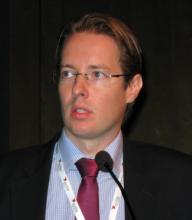GOTHENBURG, Sweden - A novel, topically applied inhibitor of the hedgehog signaling pathway showed considerable promise for the treatment of nevoid basal cell carcinoma syndrome in a pilot study.
The 0.75% cream, LDE225, is a potent and selective inhibitor of the protein "smoothened," a key player in the hedgehog signaling pathway, according to Dr. Hans Skvara.
The hedgehog pathway is important in embryonic development and tissue homeostasis. Its uncontrolled overactivity is responsible for the formation of the multiple aggressive basal cell carcinomas (BCCs) characteristic of nevoid basal cell carcinoma syndrome, an autosomal dominant disorder also known as Gorlin-Goltz syndrome, Dr. Skvara said at the annual congress of the European Academy of Dermatology and Venereology.
Twice-daily application of LDE225 for 4 weeks resulted in complete clinical response in 3 of 13 treated BCCs in eight patients and partial clinical response in another 9 tumors. Only one treated BCC showed no clinical response, according to Dr. Skvara of the Medical University of Vienna.
Of the 14 vehicle-treated BCCs in the same eight participants in this randomized, double-blind, 4-week, proof-of-concept study, only one showed a partial clinical response.
Mean tumor volume decreased by 50% in the smoothened inhibitor–treated BCCs, with no significant change over time in the vehicle-treated lesions.
Tumors treated with LDE225 showed downregulation of key genes in the hedgehog pathway, including PTCH 1 and 2 and Gli 1 and 2, in six of eight patients.
Histopathology, however, revealed nests of detectable BCC cells in all treated lesions after 4 weeks of therapy. "Four weeks was probably too short a treatment," Dr. Skvara noted.
The topical smoothened inhibitor was well tolerated, without the marked irritation characteristic of current topical therapies for BCC, such as imiquimod and 5-fluorouracil, he said. If further studies show the smoothened antagonist is able to microscopically eradicate BCC tumor nests, it could become a valuable treatment modality.
"These are some very exciting results. I’m impressed," commented session chair Dr. Jean-Paul Claudel of the University of Tours (France). He asked Dr. Skvara about next steps.
Dr. Skvara replied that a study is underway comparing 6 versus 9 weeks of treatment with two different strengths of the LDE225 cream: the 0.75% formulation used in the pilot study and a slightly lower concentration.
Dr. Skvara declared that he received a research grant from Novartis, which is developing LDE225, to conduct the pilot study.


